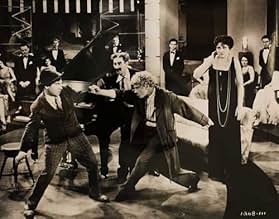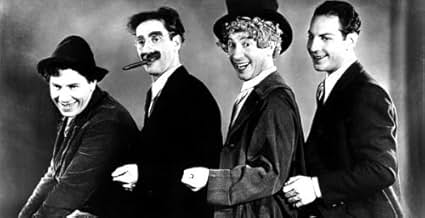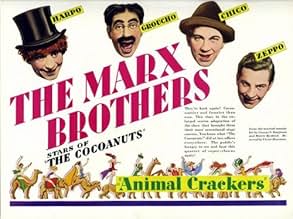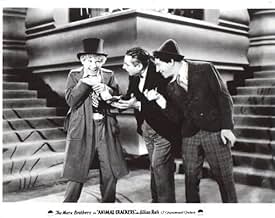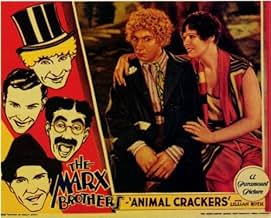AVALIAÇÃO DA IMDb
7,4/10
16 mil
SUA AVALIAÇÃO
Adicionar um enredo no seu idiomaMayhem and zaniness ensue when a valuable painting goes missing during a party in honor of famed African explorer Captain Spaulding.Mayhem and zaniness ensue when a valuable painting goes missing during a party in honor of famed African explorer Captain Spaulding.Mayhem and zaniness ensue when a valuable painting goes missing during a party in honor of famed African explorer Captain Spaulding.
- Direção
- Roteiristas
- Artistas
- Prêmios
- 2 indicações no total
Groucho Marx
- Captain Geoffrey T. Spaulding
- (as The Marx Brothers)
Harpo Marx
- The Professor
- (as The Marx Brothers)
Chico Marx
- Signor Emanuel Ravelli
- (as The Marx Brothers)
Zeppo Marx
- Horatio Jamison
- (as The Marx Brothers)
Robert Allen
- Party Guest
- (não creditado)
Donald MacBride
- Party Guest
- (não creditado)
Ann Roth
- Party Guest
- (não creditado)
Avaliações em destaque
For many years, ANIMAL CRACKERS was a "lost" film. Paramount owned the audio, and Universal owned the Visual elements (It may of been vice-versa) During the re-birth of Marx Brother popularity, ANIMAL CRACKERS mad it's way back into theatres in the Fall of 1974.
It was a thrill to see the movie in a theatre (the best place to see a classic comedy). The plot concerns a wild, out of control explorer's (Groucho Marx) visit to a Long Island estate. He comes across stuffy snobs and a questionable musician for hire (Chico Marx and his lunatic partner, Harpo.) Groucho's dialog is superb. His verbal assaults on stuffed shirts are priceless "It's not safe to ask this man a simple question" Groucho says to the audience when he talks to a pompous "art critic".
Chico and Harpo provide the more manic visual antics, especially when they steal the birth mark of above mentioned art critic. Even straight man Zeppo gets to be funny and silly.
The only real problem with the film is well voiced in critic's Richard Anobile's review "This is a RECORDING of a stage play. The camera barely moves. it just sits there and records the Marx Brothers" Still in all, see ANIMAL CRACKERS to enjoy the joy of Marx mayhem
It was a thrill to see the movie in a theatre (the best place to see a classic comedy). The plot concerns a wild, out of control explorer's (Groucho Marx) visit to a Long Island estate. He comes across stuffy snobs and a questionable musician for hire (Chico Marx and his lunatic partner, Harpo.) Groucho's dialog is superb. His verbal assaults on stuffed shirts are priceless "It's not safe to ask this man a simple question" Groucho says to the audience when he talks to a pompous "art critic".
Chico and Harpo provide the more manic visual antics, especially when they steal the birth mark of above mentioned art critic. Even straight man Zeppo gets to be funny and silly.
The only real problem with the film is well voiced in critic's Richard Anobile's review "This is a RECORDING of a stage play. The camera barely moves. it just sits there and records the Marx Brothers" Still in all, see ANIMAL CRACKERS to enjoy the joy of Marx mayhem
The Marxes second film is an even more uncinematic production than their first ("The Cocoanuts"). The camera barely moves throughout the picture, and matters are not helped at all by the fact that the print is in fairly poor condition, with entire frames missing from several scenes. And, as usual, the film contains far too much music. Nevertheless, the brothers (and especially Harpo and Chico, who in my opinion have all the funniest scenes) are amazingly lively for a 1930 film, and they make it worth seeing after all. (**1/2)
Animal Crackers is one of the best films ever done by the 4 Marx Brothers. For a start, the comedy completely works on screen, especially considering that the film was adapted from the musical stage play. And although Zeppo's comedy has always been underrated and underplayed in the five films that the 4 Marx Brothers did for Paramount Pictures, he proves in this film, as well as the four other movies he appeared with Groucho, Chico, and Harpo, that the 4 Marx Brothers made better films when the four of them worked together; as opposed to when it was just Groucho, Chico and Harpo. All the Marx Brothers films which included Zeppo were zanier films and, to me, the best of their work. Verbally, Groucho is at his razor-sharp best in Animal Crackers, with almost every one-liner dripping with comedic insults and sarcasm. Chico and Harpo perfectly add to the mayhem. The direction by Victor Heerman showed the type of skill needed to professionally control the 4 Marx Brothers to make Animal Crackers the tremendous success that it was. Though the Great Depression was taking hold on the American psyche in 1930, Animal Crackers was the perfect comedy which allowed ordinary Americans to enjoy the spoofing of America's 'Hoi Polloi'.
Though the 4 Marx Brothers' succeeding films (Monkey Business, Horse Feathers, and Duck Soup) were even more of the Hollywood film-style comedy successes which crystalized their zaniness and on-screen craziness, one should not underestimate the cinematography of George Folsey, Sr., who made the film look like a movie written especially for the screen. The look of the film (specifically the sets) makes one feel like he or she wished they had been invited to Mrs. Rittenhouse's party in honor of Captain Spaulding. Lillian Roth never looked better, and the best song in the film is her musical number with Hal Thompson, "Why Am I So Romantic?" - which was the theme music for the entire movie. Animal Crackers is one of my favorite films that the 4 Marx Brothers did for Paramount Pictures - although all five films made at Paramount are absolute gems. I strongly suggest getting the Marx Brothers' Silver Screen Collection, which is now on DVD. They are a must for your film library!
Though the 4 Marx Brothers' succeeding films (Monkey Business, Horse Feathers, and Duck Soup) were even more of the Hollywood film-style comedy successes which crystalized their zaniness and on-screen craziness, one should not underestimate the cinematography of George Folsey, Sr., who made the film look like a movie written especially for the screen. The look of the film (specifically the sets) makes one feel like he or she wished they had been invited to Mrs. Rittenhouse's party in honor of Captain Spaulding. Lillian Roth never looked better, and the best song in the film is her musical number with Hal Thompson, "Why Am I So Romantic?" - which was the theme music for the entire movie. Animal Crackers is one of my favorite films that the 4 Marx Brothers did for Paramount Pictures - although all five films made at Paramount are absolute gems. I strongly suggest getting the Marx Brothers' Silver Screen Collection, which is now on DVD. They are a must for your film library!
Judging by the script, you'd never believe that "Animal Crackers" is over seventy years old. Think of all the "postmodern" things that happen in this movie: Groucho directly addresses the audience to apologize for a bad joke; Harpo shoots a gun at a statue, only to see the statue come to life and return fire; and Margaret Dumont freezes in time while Groucho has a "strange interlude" and rambles to the audience about the perils of marriage and living with your folks! Of course, the absolutely ancient and decaying print will remind you that "Animal Crackers" is older than the hills, but otherwise, it's much fresher and weirder than the stuff that passes for comedy today.
Like "The Cocoanuts," this movie is based on a play, and as such it is considerably longer and stagier than most of the later Marx movies. The pace does drag a bit towards the end, especially since the plot disappears (along with Zeppo) for long segments at a time. But many of the individual segments are classic, including the often (and rightly) praised bridge game and Harpo's gag with the cutlery-filled sleeves. Even the music segments hold up well, particularly Chico's piano routine that gets savaged by Groucho.
Interestingly, there is a prominent romantic subplot to this film, which puts paid to the fallacy that Marx Brothers movies didn't have romances until MGM got its hands on them. However, the romance isn't nearly as intrusive or annoying here as in their later vehicles, so there's still plenty of reason to be annoyed with good old MGM...
Like "The Cocoanuts," this movie is based on a play, and as such it is considerably longer and stagier than most of the later Marx movies. The pace does drag a bit towards the end, especially since the plot disappears (along with Zeppo) for long segments at a time. But many of the individual segments are classic, including the often (and rightly) praised bridge game and Harpo's gag with the cutlery-filled sleeves. Even the music segments hold up well, particularly Chico's piano routine that gets savaged by Groucho.
Interestingly, there is a prominent romantic subplot to this film, which puts paid to the fallacy that Marx Brothers movies didn't have romances until MGM got its hands on them. However, the romance isn't nearly as intrusive or annoying here as in their later vehicles, so there's still plenty of reason to be annoyed with good old MGM...
Once again, this Marx Brothers film is different from most comedies in that is features a mile-a-minute gags, either verbal or sight, constant silliness and some music thrown in the mix. All of it runs the gamut from very clever to stupid. However, if it gets stupid hang around another minute or so and you'll find something to laugh at.
One problem, especially with this film, is that some of the humor is dated and/or topical, meaning what was funny back then isn't necessarily now or the subject Groucho or Chico is talking about was big news back then but unknown now.
Nonetheless, I still enjoyed this and found a lot of funny material. I enjoy the Marx Brothers clever stuff and their slapstick. I particularly appreciated Groucho apparently ad-libbing one scene. In a few others he acted like he was ad- libbing, turning his head and talking to the camera. You don't see much of that stuff, and it's funny.
Two of the three songs were instrumentals, and they seemed to take away from the pace of the story. Groucho's song, "Hooray For Captain Spaulding," is a classic.
Some consider this to be the best Marx Brothers movie but I found several others I liked a lot more, such as "Horse Feathers" and "Duck Soup," just to name two.
One problem, especially with this film, is that some of the humor is dated and/or topical, meaning what was funny back then isn't necessarily now or the subject Groucho or Chico is talking about was big news back then but unknown now.
Nonetheless, I still enjoyed this and found a lot of funny material. I enjoy the Marx Brothers clever stuff and their slapstick. I particularly appreciated Groucho apparently ad-libbing one scene. In a few others he acted like he was ad- libbing, turning his head and talking to the camera. You don't see much of that stuff, and it's funny.
Two of the three songs were instrumentals, and they seemed to take away from the pace of the story. Groucho's song, "Hooray For Captain Spaulding," is a classic.
Some consider this to be the best Marx Brothers movie but I found several others I liked a lot more, such as "Horse Feathers" and "Duck Soup," just to name two.
Você sabia?
- CuriosidadesIn the interchange between Spaulding and Ravelli near the end of the film, Spaulding refers to "Chic Sale". Chic Sale was a vaudeville performer well-known to audiences in the 1930s. His name, however, had a parallel meaning. It had become a euphemism for an outhouse. Groucho Marx may have thought the reference as a way around the Hays Office code. The comedian Soupy Hines changed his name to Soupy Sales in honor of the original Sale. His birth name was Milton Supman.
- Erros de gravaçãoWhen Professor replaces the handgun for a rifle after he shoots himself in the foot, Hives can be seen in the background walking behind the column, clearly awaiting his turn to enter the scene.
- Citações
Capt. Spaulding: [Speaking directly at the camera] Well, all the jokes can't be good. You've got to expect that once in awhile.
- Versões alternativasCensored for a 1936 reissue to meet Production Code requirements; this censored version was the only one available for television showings and subsequent VHS/DVD releases. A surviving complete and uncensored print was found in England, and is the source being used for the 2016 blu-ray release.
- ConexõesFeatured in 46th Annual Academy Awards (1974)
- Trilhas sonorasYou Must Do Your Best Tonight
(1930) (uncredited)
Music by Harry Ruby
Lyrics by Bert Kalmar
Sung by Robert Greig and The Music Masters
Principais escolhas
Faça login para avaliar e ver a lista de recomendações personalizadas
- How long is Animal Crackers?Fornecido pela Alexa
Detalhes
- Data de lançamento
- País de origem
- Idioma
- Também conhecido como
- Animal Crackers
- Locações de filme
- Empresa de produção
- Consulte mais créditos da empresa na IMDbPro
Bilheteria
- Faturamento bruto nos EUA e Canadá
- US$ 910.015
- Tempo de duração
- 1 h 37 min(97 min)
- Cor
Contribua para esta página
Sugerir uma alteração ou adicionar conteúdo ausente


